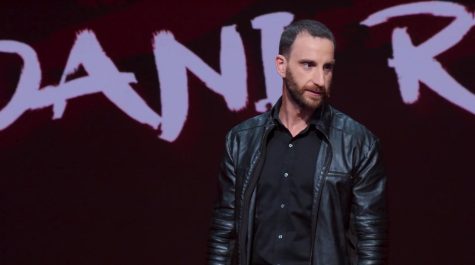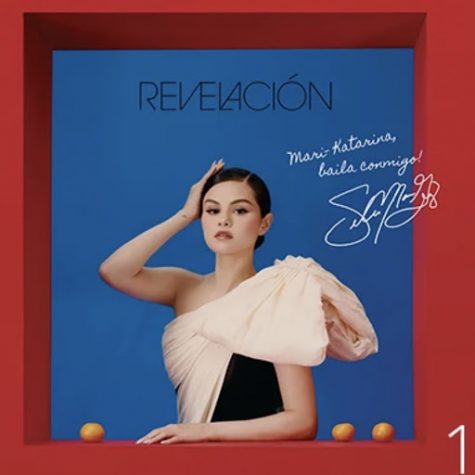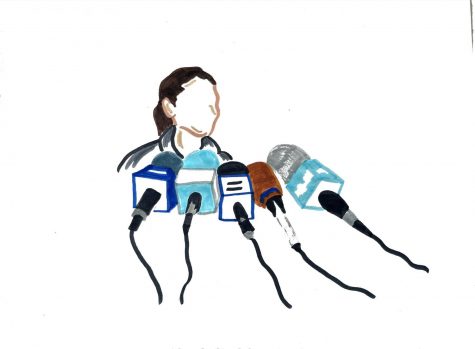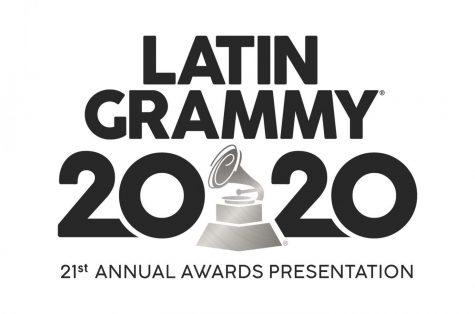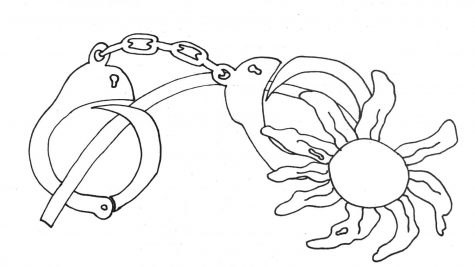La comedia “Choque Cultural (Todavía) en América” provee humor de una manera inesperada
Trailer cortesía de Berkeley Rep
EL ESCENARIO EN que los actores realizan encaja con el tema de un choque de cultura, estableciendo el tono para el espectáculo.
March 14, 2020
Al Repertory Theater, en el corazón de Berkeley, un grupo de artistas chicanos está presentando un espectáculo—en inglés—esencial para entender la historia de culturas diferentes convergiendo en los EEUU. Choque Cultural (Todavía) en América, incorpora una combinación de historias sobre la inmigración desde perspectivas diferentes, y mezcla maravillosamente el humor con mensajes inolvidables.
El espectáculo consiste en unas parodias individuales, realizadas por solo tres hombres—Richard Montoya, Ricardo Salinas y Herbert Siguenza—cuyo trabajo es muy admirable porque actúan en una docena de parodias sin tomar un descanso. Cada parodia se dirige a un grupo diferente de inmigrantes comunes en los EEUU—puertorriqueños, cubanos, filipinos, ugandesos, noruegos y muchos más. A causa de esta diversidad, por lo menos una parte relaciona con todos.
Lo que importa más sobre este espectáculo es que incorpora mucha información relevante sobre el choque moderno entre algunos estadounidenses racistas y latinos que quieren inmigrar. Estos tópicos necesitan ser representados para hacer más estadounidenses entender la lucha grave que experimentan inmigrantes hispanohablantes, y la manera en que se incluyen es muy artística.
Al principio del espectáculo, hay una escena poderosa entre un inmigrante hispanohablante y algunos oficiales de ICE. Muestra el amor que va detrás de la decisión de una familia en mudarse a los EEUU, pero la tragedia que la escena representó era demasiado real, dejando una impresión muy fuerte de pena y compasión.

A diferencia de muchos cuentos de inmigración, la perspectiva del viaje no solo se considera del punto de vista de un inmigrante. El cuento de esa escena regresa otra vez, pero desde la perspectiva de un abogado de inmigración. Su simpatía y asco con lo que está pasando a sus clientes crea un efecto enorme, exigiendo que los estadounidenses consideren su privilegio y paren de vivir en ignorancia, algo esencial en hablar sobre la experiencia latina.
El espectáculo incluye un montón de momentos a los que todos los miembros del público pueden relacionarse a pesar de la raza, aunque la mayoría de las parodias se enfocan en la perspectiva hispana. Estos incluyen esos momentos torpes cuando nos damos cuenta que Jesús no era blanco y las veces donde un padre es alocadamente protector de sus hijos.
Sin embargo, también hay un enfoque en los nativos de Berkeley, muchos en el cual son jipis antiguos de los años sesenta. Aunque algunas referencias de las parodias con jipis son difíciles de entender, si acude al espectáculo con un poco de fondo cultural sobre su historia, será divertidísimo. A pesar de todo, a todos les va a encantar la parte donde los hombres, quienes están representando jipis femeninas y viejas, tiran su marijuana al público como algunos locos.
Es esta forma de incluir al público que le hace al espectáculo tan único, y las mejores partes que involucaron el público tuvieron una forma de bailar. Durante una escena con un inmigrante musulmán, él empieza hablar sobre su cultura y le invita a una mujer a acompañarle en un baile. Inmediatamente en un momento torpe inesperado él la paró y dijo, “Ay no no no! Voy a dirigirnos, tú feminista jipi de Berkeley,” creando muchas risas bien merecidas porque él pudo actuar en el acto y relacionarse al público.
A pesar de sus habilidades, algunos pueden encontrar que unas parodias son racistas, debido al hecho que los artistas no son miembros de todos los grupos étnicos retratados. Aunque las burlas solo involucra a los hombres imitando las voces de los inmigrantes, hay espacio para interpretarlo como quiera. Los actores reconocen la lucha que inmigrantes experimentan para venir a los EEUU, pero las impresiones eran exageradas inmoralmente para burlarse de ellos.
Los actores brillan, por eso, mientras representan sus propias razas. Una parodia memorable tiene un actor demostrando las maneras diferentes en que la gente baila la salsa. Parodias como esta son graciosas a causa de la manera en que les critican las maneras diferentes en que la gente interpreta la salsa, especialmente la manera como personas blancas la bailan.

Aunque este evento lleva al público por varios altibajos, pero su humor e impacto no deben ser ignorados. Por eso, este evento vale la pena de ver y estará en el Repertory Theater hasta el 5 de abril. Los boletos pueden costar entre $27.50 a $80 dependiendo de la ubicación de los asientos.
ENGLISH VERSION
At the Repertory Theater, in the heart of Berkeley, a group of Chicano artists are presenting a show—in English—that is essential for understanding the history of different cultures converging in the U.S. Culture Clash (Still) in America incorporates a combination of immigration stories from many different countries, and beautifully mixes humor with essential messages that cannot be forgotten.
The show consists of individual sketches that are performed by only three men—Richard Montoya, Ricardo Salinas and Herbert Siguenza—which was very impressive because they act in a dozen sketches without taking a break. Each sketch addresses a different group of common immigrants in the U.S.—Puerto Ricans, Cubans, Filipinos, Ugandans, Norwegians and many more. Because of this diversity, the show is relatable for everybody.
What stands out the most is how the show depicts clashes between racist Americans and Latinos who want to immigrate. It’s essential that this is addressed, for Americans need to know how Hispanic immigrants struggle, and the actors portray this very artistically.
At the beginning of the show, there is a powerful scene between a Latino immigrant and some Immigration and Customs Enforcement officials. It shows the love that goes behind many families’ decision to move to the U.S., but the tragedy the scene depicted is all too real, leaving a very strong impression of grief and sympathy.
Unlike many immigration stories, the perspective of the journey to America isn’t just portrayed from an immigrant point-of-view. The story from this scene returns again, but from the perspective of an immigration lawyer. His sympathy and disgust with what is happening to his clients creates a strong impact, demanding that Americans consider their privilege and stop living in ignorance, which is essential in discussing the Latino experience.
Although the majority of the sketches focus on the perspective of a Spanish speaker, the show includes many moments that many can connect to, regardless of race. These include those awkward moments where we realize Jesus wasn’t white and the times a parent was overly protective.
There is also a focus geared towards Berkeley natives, many of whom are former hippies from the 1960s. Although some references in the sketches with hippies may be difficult to understand, with a little bit of background knowledge, the sketches are hilarious. The part where the men, who are portraying old grandma hippies, wildly throw their marijuana at the audience is a crowd pleaser.
This audience inclusion is what makes the show so unique, and the best parts that involved the audience had some form of dancing. During a scene with a Muslim immigrant, for example, the actor begins to talk about his culture and invites a woman to accompany him in a dance. Immediately, in an awkward, unexpected moment, he stopped her and said, “Oh no, no, no! I’m going to lead us, you Berkeley hippy feminist,” prompting many well-deserved laughs because he could act in the moment and relate to the audience.
Despite the actor’s clear talent, some may interpret a few of the sketches as racist because the actors are not members of several of the portrayed ethnic groups. Though the jokes go no further than voice imitations, there’s room for interpretation. The actors do recognize the fight immigrants experienced in coming here through these portrayals, but the impressions were unethically exaggerated in a way that makes fun of them.
The actors shine brightest, therefore, when representing their own races. One memorable skit had an actor demonstrating the different ways that people dance salsa. Skits such as these are hilarious because of the way the actor lightly criticizes how different people interpret salsa, especially the way white people dance.
Though this show takes the audience through ebbs and flows, its humor and impact should not be ignored. Therefore, this event is worth seeing and will be performed in the Repertory Theater through April 5th. Tickets cost between $27.50 and $80 depending on seating location.









